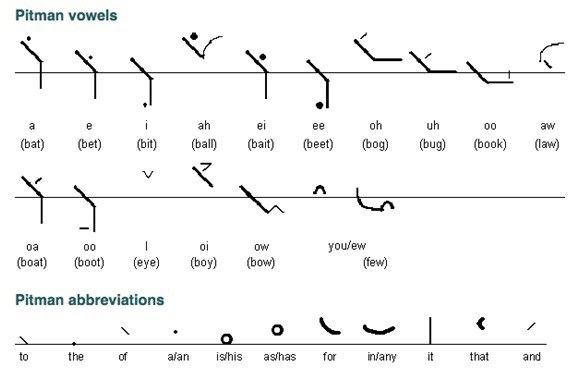Back to: BUSINESS STUDIES JSS3
Welcome to Class !!
We are eager to have you join us !!
In today’s Christain Religious Studies class, We will be Reviewing Vowel Sounds in Shorthand. We hope you enjoy the class!

VOWEL SOUNDS
In shorthand, the sound of the first vowel in a word determines where and how a word is written. There are 12 vowels in Pitman Shorthand and in the English Language. In shorthand these vowels are grouped as follows:

FIRST PLACE VOWELS
These are four in number and are written in the first place, that is, at the beginning of a stroke. When the first vowel in a word is a first-place vowel, the outline is written in the first position, i.e. the first downstroke or upstroke in the outline is written above the line. Examples:
1 Long ‘ah’ is represented by a heavy dot ( . ) as in
Pa, Ma, Calm, Palm, etc
2 Short ‘a’ is represented by a light dot ( . ) as in
at, add, path, pal, pack, etc
3 Long ‘aw’ is represented by a heavy dash ( – ) e.g.
saw, paw, pawpaw, ball, bought, talk, etc.
4 Short ‘o’ is represented by a light dash ( – ) e.g.
top, odd, doll, dog, job, etc.
SECOND PLACE VOWELS
These are represented by
two heavy vowels ‘0’ and ‘a’ as in
- toe, oat, oath, boat, both, etc. – these are represented by heavy dashes placed at the middle of the outlines
- pay, may, say, bay, etc – these are represented by heavy dots at the middle of the outline
Two light vowels ‘o’ and ‘a’ as in
- cup, us, up, touch, Dutch, etc – represented by light dashes at the middle of the outlines
- get, engage, enough, etc. – represented by light dots at the middle of the outlines
THIRD PLACE VOWELS
These are four in number –
two for long vowels ‘e’ and ‘oo’ as in
- fee, feed, deep, keep, teach, theme, etc – represented with heavy dots at the end of the outlines
- chew, shoe, food, move, youth, etc. – represented by heavy dashes at the end of the outlines.
Two short ‘i’ and ‘oo’ as in
- bit, pick, big, ship, etc – represented with light dots at the end of the outlines and
- book, look, took, wood, etc. – represented with light dashes at the end of the outlines.
SHORT FORMS
These are frequently occurring words in the English Language, hence short forms are designed for them for high-speed writing.
They include- be, it, do, which, the, to, two or too, for, a or an, of, on, had, different or difference, put, wish, etc.
PHRASES
Are the act of joining two or more shorthand outlines together where possible to enhance speed writing. Examples are –
To be, to the, to do, to pay, pay the, can you, with you, they will, they will be, etc.
CIRCLE S/Z AND DOTING
For convenience, some words ending with ‘ing’ or S/Z end with dots in place of the ‘ing’ e.g.
Space, but spacing, set, but setting, sit, but sitting, seek, but seeking, etc
EVALUATION
1 How many short vowels are there in Pitman Shorthand? Give examples.
2 List 12 examples of words containing heavy vowels.
READING ASSIGNMENT
Read NEW ERA SHORTHAND pages 9-10 and 13-14
WEEKEND ASSIGNMENT
1 The act of joining two or more shorthand outlines is called
A. joining B. phrasing C. consonant D. vowel DING
2 The act writing frequently occurring words with one sign or one stroke is called
A. short forms B. phrasing C. frequency D. diphones
3 The outline for the word ‘oat’ is ———— the line
A. on B. above C. through D. None of the above
4) The word ‘bill’ is controlled by —– place vowel
A. 1st B. 2nd C. 3rd D. 4th
5) There are ——- consonants in Pitman Shorthand.
a 10 b 20 c 25 d 24
THEORY
1 How many short vowels are there in Pitman Shorthand? Give examples
2 List 12 words containing long vowels vowels
We have come to the end of this class. We do hope you enjoyed the class?
Should you have any further question, feel free to ask in the comment section below and trust us to respond as soon as possible.
In our next class, we will be talking about Different types of Display Heading. We are very much eager to meet you there.

Weekend assignment number five(5)
This is incredible
I’ve learnt alot more than in class